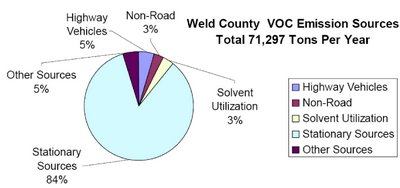Weld County Opposes Clean Air in Denver Metro Area
Strangely and unfortunately, Weld County is opposing the state's proposal to ratchet down on emissions of smog forming compounds from oil and gas developments north of Denver. In their request for party status, the County stated:
"The Board of Commissioners of Weld County desires to challenge the Air Quality Control Commission’s position that the recent increased levels of volatile organic compounds (VOCs) are due primarily to the operation of oil and gas production equipment. The Commission’s proposed regulations, which would increase the number of emission control devices at a high cost to the industry, are misdirected in that they ignore other sources of ozone, such as automobile emissions. It is the belief of the Board that the oil and gas industry has done as much as it should do to reduce or eliminate VOCs and should not be forced through the Commission’s regulations to do more."
The amazing thing about Weld County's opposition, is that even industry is not as opposed to state efforts to ratchet down on smog forming compounds. At a meeting today, the Colorado Oil and Gas Association itself stated that more should be done to limit emissions of smog forming compounds from oil and gas developments north of Denver.
What's more, Weld County's opposition to clean air puts communities north of Denver at great risk. The town of Greeley suffered five exceedances of the federal health standard for ozone this last summer, which is due to a massive increase in volatile organic compound emissions from the oil and gas industry. How massive?
According to current requirements, controlled emissions of smog forming compounds were not to exceed 91.3 tons/day in the Denver area by the year 2007. However, as of 2004, controlled emissions already reached 150 tons/day, over 60% higher than projected 2007 levels.
Weld County apparently believes that mobile sources, like cars, are responsible. However, data from the state shows that in Weld County, mobile sources, like highway vehicles, release only 5% of total smog forming compounds, while stationary sources, which include oil and gas, release 84% of total smog forming compounds.

Weld County's opposition to clean air seems very misplaced.

0 Comments:
Post a Comment
<< Home